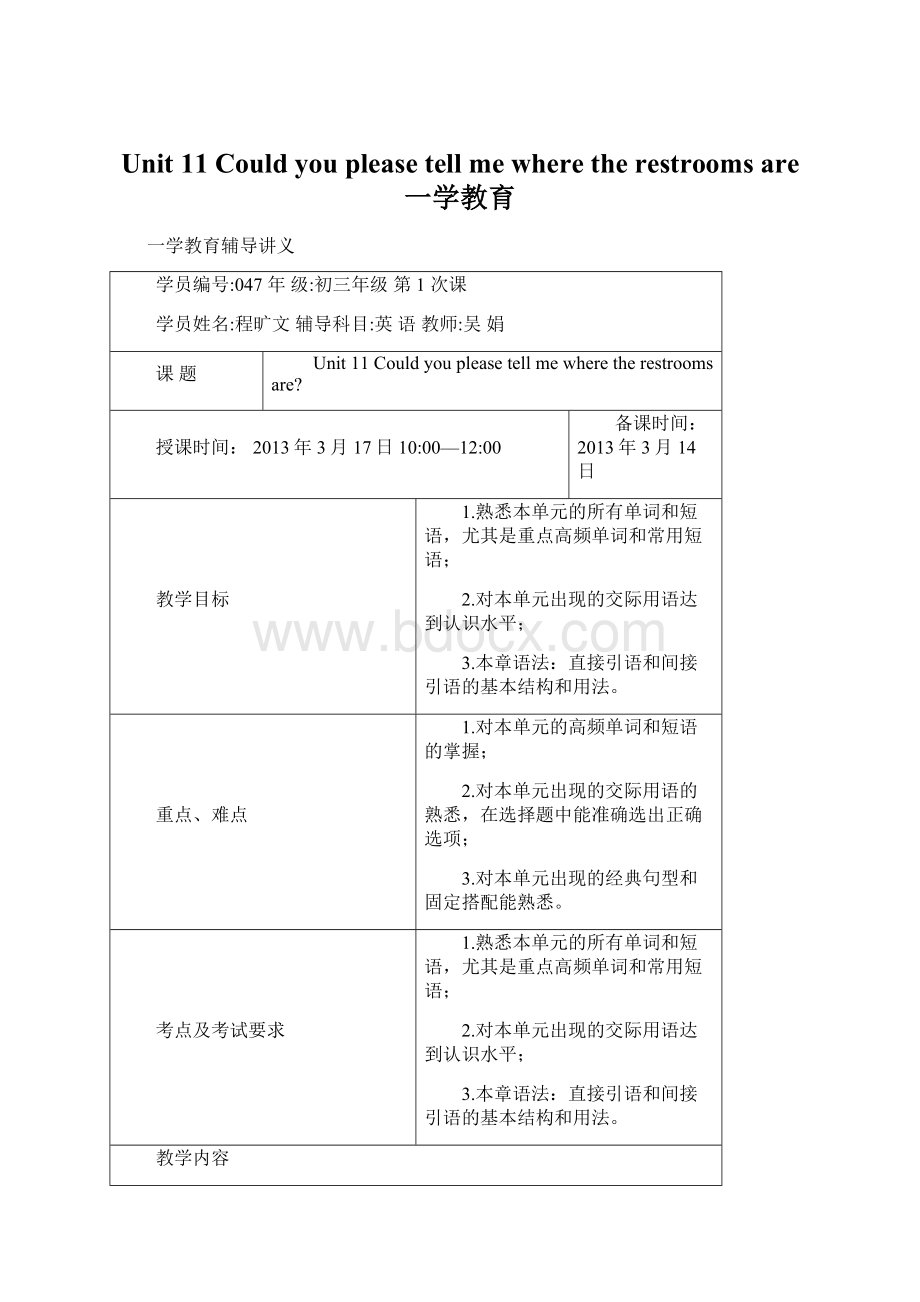Unit 11Couldyou pleasetell me where the restrooms are一学教育.docx
《Unit 11Couldyou pleasetell me where the restrooms are一学教育.docx》由会员分享,可在线阅读,更多相关《Unit 11Couldyou pleasetell me where the restrooms are一学教育.docx(16页珍藏版)》请在冰豆网上搜索。

Unit11Couldyoupleasetellmewheretherestroomsare一学教育
一学教育辅导讲义
学员编号:
047年级:
初三年级第1次课
学员姓名:
程旷文辅导科目:
英语教师:
吴娟
课题
Unit11Couldyoupleasetellmewheretherestroomsare?
授课时间:
2013年3月17日10:
00—12:
00
备课时间:
2013年3月14日
教学目标
1.熟悉本单元的所有单词和短语,尤其是重点高频单词和常用短语;
2.对本单元出现的交际用语达到认识水平;
3.本章语法:
直接引语和间接引语的基本结构和用法。
重点、难点
1.对本单元的高频单词和短语的掌握;
2.对本单元出现的交际用语的熟悉,在选择题中能准确选出正确选项;
3.对本单元出现的经典句型和固定搭配能熟悉。
考点及考试要求
1.熟悉本单元的所有单词和短语,尤其是重点高频单词和常用短语;
2.对本单元出现的交际用语达到认识水平;
3.本章语法:
直接引语和间接引语的基本结构和用法。
教学内容
第一课时必考词汇
1.单词(带读、认知、听写)
1.Magic
(1)作不可数名词中,意为“魔术、魔力”
Eg:
Thepaperturnedgreenasifbymagic.
(2)作形容词时,意为“魔术的、有魔力的”
Eg:
Thisisamagicmirror
2.Freshadj.新鲜的;清新的
Weboughtsomefreshmeatinthesupermarket.我们在超市买了一些鲜肉。
Freshwater淡水
3.Lendv.借出、借出
Lend作动词时,常用短语lendsb.sth.或lendsth.tosb.中,意为“把某物借给某人”
Eg:
Canyoulendmeyourbike?
=Canyoulendyourbiketome?
你能把你的自行车借给我吗?
【辨析】lend和borrow的区别
Lend是主语向外借出,常用于lendsb.sth.或lendsth.tosb.短语
Borrow是主语向内借入,常用于borrowsth.fromsb.短语
4.Parkv.停车
Park可作及物动词,也可作不及物动词。
Eg:
Wheredidyouparkyourcar?
(作及物动词)你把你的车停在哪儿了?
Youcan’tparkinthecenterofthecity.(作及物动词)你不能在市中心停车。
【拓展】park还可作名词,意为“公园”。
Eg:
Let’stakeawalkinthepark.咱们去公园散步吧。
Thereisabigparkinourcity.在我们的城市有一个大公园。
5.Directadj.直接的;直率的
ThereisadirecttrainfromBeijingtoShanghai.从北京到上海有直达列车。
【拓展】direct作动词的意为“指引、指挥、导演”
Eg:
Wouldyoupleasedirectmetothezoo?
请问去动物园怎么走?
6.Ordern.命令,指示
Order作可数名词,常用短语有:
giveorders下达命令takeorders听从命令;执行命令
【拓展】order作动词时意为“订购、命令”
Eg:
Iwanttoorderadigitalcamera.我想订购一部数码相机。
7.Wonderv.觉得奇怪;想知道
Shewonderedwhatthechildwasdoing.她想知道这个孩子正在做什么。
【拓展】wonder作名词时意为“惊讶、奇迹”。
Eg:
TheGreatWallisoneoftheworldwonders.长城是世界奇迹之一。
8.Leadv.引导;引诱n.主角
(1)作动词时,意为“引导、引诱”
Eg:
Heledhismentofight.他率领他的部队作战。
(2)作名词时,意为(戏剧、电影等中的)主角”。
Eg:
Sheisaleadsingerinapopgroup.她是流行歌曲演唱团体的主唱。
【拓展】lead其他常见含义:
v.领先SheleadsherclassinEnglish.她在班上英语成绩领先。
v.过着(生活)Weleadaquietlife.我们过着宁静生活。
第二课时重点句型
1.getsomeinformationaboutthetown
Information是不可数名词,指通过学习、阅读等方式而获得的“信息、情报”等。
“一条信息”应说成apieceofinformation.
Hewantedtogetnewinformationfromthecomputer.
【注意】information、news、message的区别:
Information强调通过学习、阅读等而获得的信息;news意为“信息、新闻”,是不可数名词,指公众感兴趣的、近来发生的事件,尤其指通过广播、电视、网络等报道的事件;message一般指口头传送或书写的“音信”,是可数名词。
Eg:
Weoftenlistentothenewsaftersupper.
Wouldyoumindgivinghimamessage?
2.Couldyoupleasetellmewheretherestroomsare?
Couldyouplease...?
意为:
请你......好吗?
这个句子中的could也可以换用can;不过使用could更加委婉、礼貌。
Couldyoupleasesayitagain?
请你再说一遍好吗?
Couldyoupleasegivemeahand?
你可以帮帮我吗?
【注意】表示礼貌的请求的句子还有:
(1)Wouldyoupleasedosth.?
Eg:
Wouldyoupleasegivemeacupoftea?
(2)Wouldyouliketodosth.?
Eg:
wouldyouliketocometomyparty?
(3)Couldyouminddoingsth.?
Eg:
Wouldyoumindmyopeningthewindow?
3.Thedrugstoreisbetweenthefurniturestoreandthebookstore.
(1)between...and...在...和...之间
Let’skeepthesecretbetweenyouandme.
(2)Furnituren.(总称)家具:
这是一个不可数名词
一件家具anarticleoffurniture
一套家具asuitoffurniture
Eg:
Theyhavepurchasedmuchfurniture.
4.DoyouknowwhereIcanexchangemoney?
(1)exchange用作及物动词时,意为:
交换、调换
Willyouexchangedseatswithme?
I’dliketoexchangesomepoundsfordollars.
(2)Exchange用作名词时,意为:
交换、互换,交换物
Let’shaveanexchangeofviewsonthematter.
5.Thebankisnexttothebookstore.
Nextto意为:
在......的旁边,贴近,紧挨着
Ourhouseisnexttothepostoffice.
YoucansitnexttoRogeratdinner.
6.Couldyoutellmehowtogettothepostoffice?
本句中使用“疑问句+不定式”作宾语。
在不定式的前面使用what,which,when,where,how等构成的不定式短语在句中起名词作用,常在句中充当主语、宾语、表语等。
Whattosaywasn’tdecided.说什么还没有决定。
Thequestioniswheretogo.问题是去哪儿。
Iwonderwhentostarted.我想知道什么时候出发。
7.Igotothemallbecausemyfriendshangoutthere.
Hangout是英语中的俚语,意为“tospendalotoftimeinaplacewithsomeone”,即“(在某个地方和别人一起)闲逛”
Doeshestillhangoutinthestreet?
他还在街上闲逛吗?
【注意】hangout还有“把...挂出”;“靠前;伸出身子”的意思
Eg:
OnNationalDay,flagarehungoutofeverywindow.
Don’thangoutofthewindow,oryoumayfall.
Hehangsoutinanoldhouse.
Theyhungouttheflags.
8.Ipreferbeingoutside.
Prefer意为“likeonethingbetterthananother”,其后可以接:
名词、代词、动词的-ing形式等;在prefer后接动词不定式时意为“更愿意做...”
Hepreferredtostayathomeratherthangowithus.他宁愿呆在家里,不愿和我们在一起。
Theypreferredhernottogowiththem.他们宁愿她不跟他们去。
【拓展】和prefer相关的句型
Prefer...to...宁愿...不愿...
Prefer...ratherthan...宁愿....而不愿...
Eg:
Ipreferteatocoffee.
Iprefertodothisratherthanthat.我宁愿做这件事而不愿做那件事。
9.Therearealotoffreeconcertthere.
Free在这里用作形容词,意为:
免费的;free还有“自由的、自在的”的意思。
短语:
setfree施放(人或物)
Eg:
Aftertenyearsinprison,hewasafreemanagain.
Areyoufreethisafternoon?
10.There’salwayssomethinghappening.
这是个therebe句型,常构成Thereissb./sth.doingsth.这个句型中There是引导词,其后的sb./sth.的后面再接一个动词时,应该使用非谓语形式。
Eg:
Therewasamanstandingunderthattree.
Therewasacowtiedtothebigtree.
11.It’skindofsmall.
Kindof意为:
有几分,有点儿;相当于一个副词,可以修饰形容词、副词或动词;是非正式用法。
It’skindoflate.
I’mkindoffallingasleeponmyfeet.
第三课时直接引语和间接引语的讲解
直接引语(DirectSpeech):
当我们引用别人的话语时,若引用的是原话,被引用的部分叫直接引语。
间间接引语(IndirectSpeech):
当我们引用别人的话语时,也可以用自己的话把意思转述出来,这种转述的别人说话的部分叫做间接引语。
典例句:
1.Shesaid,”IlikeEnglishverymuch.“(直接引语)
(她说:
“我非常喜欢英语”。
)
典例句:
2.ShesaidshelikedEnglishverymuch.(间接引语)
(她说她非常喜欢英语。
)
一、直接引语与间接引语的转化
A.陈述句的间接引语
直接引语是陈述句,变为间接引语时,在多数情况下都构成一个that引导的宾语从句,引述动词通常是为say,tell等。
与此同时,间接引语中的人称、时态和其他方面也要相应有所变化,其中人称的变化与汉语语的变化是一致的。
例1)Johnsaid,“I’vebeenlateagain.”
→Johnsaidthathehadbeenlateagain.
例2)Shesaid,”Weareveryfondofsports.”
→Shesaidthattheywereveryfondofsports.
B.疑问句的间接引语
1.一般疑问句
一般疑问句改为间接引语时,要用陈述语序,并要加连词if或whether,其主句动词常用ask,wonder,wawanttoknow,didn'tknow等。
句末不用问号。
例1)Myteacheraskedme,“DoyoulikeAmericancountrymusic?
”
→Myteacheraskedmeif/whetherIlikedAmericancountrymusic.
重要提示:
if和whether一般可通用,但
whether可以和ornot连用,if不能。
例:
Iaskedherwhethershehadvisitedthemuseumtwodaysbeforeornot.
2.反意疑问句
反反意疑问句转述为间接引语时,要把它看成是一般疑问句,即句型为陈述句,在句子前面加if或whether,往往往后面还要加上ornot,常用whether……ornot.
例1)Shecried,”Youhavemadeabigmistake,haven’tyou?
”
→ShecriedwhetherIhadmadeabigmistakeornot.
3.否定的一般疑问句和选择问句
如果直接引语为否定的一般问句或选择疑问句时,用whether……ornot连接。
例1)Shesaid,Don'tyouknowmytelephonenumber
→SheaskedmewhetherIknewhertelephonenumberornot.
例2)DoyoulikethisoneorthatoneTomasked.
→TomaskedmewhetherIlikedthisoneorthatone.
4.特殊疑问句
间接引语为特殊疑问句时,间接引语前仍然用特殊疑问词作为连词引导宾语从句,注意从句必须用陈述语语序,主句谓语动词常用ask。
例1)Heasked,“Howdoyoulikeit?
”
→HeaskedmehowIlikedit.
例2)Sheaskedme,“What'sthematterwithyou?
”
→Sheaskedmewhatwasthematterwithme.
例3)”Howmanybooksdoyouhave?
”sheasked.
→SheaskedmehowmanybooksIhad.
C.祈使句的间接引语
1.直接引语为祈使句时,间接引语往往用复合宾来表示,其结构为主语+谓语+宾语+宾语补足语(动词词不定式)。
引述动词可根据口气选用tell,ask,order,command,request等词,句中please去掉。
例1)Shesaidtome,“Pleasehavearest.“
→Sheaskedmetohavearest.
例2)”Don'tallansweratonce”,shesaidtothepupils.
→Shetoldthepupilsnottoanswerallatonce.
2.带有let的祈使句(表示请求,建议或命令),可用suggest+-ing形式或suggest+that从句来表示其相应同的意思。
例1)”Let'sgoforawalk”,saidthegirl.
→Thegirlsuggestedgoingforawalk.
例2)Theteachersaid,“LetLilytidytheclassroom.”
→TheteachersuggestedthatLilyshouldtidytheclassroom.
D.感叹句的间接引语
1.直接引语是感叹句变为间接引语时,多采用宾语从句结构,既可用what或how引导,也可用that引导导。
例1)”Whatacleverboyyouare!
”Myteachersaidtohim.
→Myteachertoldhimwhatacleverboyhewas.
→Myteachertoldhimthathewasaverycleverboy.
例2)Shesaid,”Howinterestingthefilmis!
”
→Shesaidthathowinterestingthefilmwas.
2.有些感叹句可以根据原句的意思,采用适当的动词变为陈述句,不需用间接宾语来转述。
例1)“Help!
“hecried.
→Hecalledforhelp.
例2)”HappyChristmas!
”hesaid.
→HewishedmeahappyChristmas.
E.“Wouldyouplease……?
“如何变为间接引语
“Wouldyouplease……?
“虽然是个一般疑问句,但它表示的是”请求”,变为间接引语时,一般用动词不定定式来表示。
句型:
主语+ask/invite+宾语+不定式
例1)”Wouldyoupleasehavelunchwithmetomorrow?
”MrZhouaskedme.
→MrZhouasked/invitedmetohavelunchwithhimthenextday.
二、间接引语中的词语变化
直接引语变为间接引语时,间接引语中的动词时态、人称代词、物主代词、指示代词、时间和地点状语以及主谓语词序往往要作相应的变化。
A.时态的变化
直接引语转化为间接引语时,主句动词的时态若是过去时,间接引语的时态要变为相应的过去时态。
直接引语中的时态
间接引语中的时态
一般现在时
一般过去时
一般过去时、现在完成时
过去完成时
过去完成时
过去完成时(不变)
一般将来时
过去将来时
现在进行时
过去进行时
现在完成进行时
过去完成进行时
shall
should
should
should(不变)
will
would
would
would(不变)
may
might
might
might(不变)
can
could
could
could(不变)
例1)Shesaid,”Ilikemathsverymuch.”(一般现在时)
→Shesaidthatshelikedmathsverymuch.(一般过去时)
例2)Hesaid,“I’veneverseenthisman.”(现在完成时)
→Hesaidthathehadneverseenthatman.(过去完成时)
例3)Joesaid,”I’mlisteningtomusicinmyroom.”(现在进行时)
→Joesaidthathewaslisteningtomusicinhisroom.(过去进行时)
提示1:
当引语表示一般真理或客观事实时,转化为间接引语时时态不变,并且要使用一般现在时。
如
例1)Heasked,“whichstaristhebiggest?
”
→Heaskedwhichstaristhebiggest.
例2)Theteachertoldus,”Theearthgoesaroundthesun.”
→Theteachertoldustheearthgoesaroundthesun.
提示2:
当直接引语有确定的过去时间时,时态不需变化。
例1)Chloesaid,”Thestorytookplaceinthe1930s.”
→Chloesaidthatthestorytookplaceinthe1930s.
B.时间状语、地点状语和指示代词的变化
直接引语中的状语、指示代词
间接引语中的状语、指示代词
today
thatday当天
yesterday
thedaybefore前一天
tomorrow
thenextday/thefollowingday第二天
nextweek/month/year……
thenextweek/month/year……
lastweek/month/year
theweek/month/year……before
ago
before
three/four/……yearsago
three/four/……yearsbefore
in2008
in2008(不变)
now
then那时
sofar
bythen
here
there
this
that
these
those
thedaybeforeyesterday前天
twodaysbefore两天前
thedayaftertomorrow后天
intwodays’time/twodaysafter两天后
C.方向性动词的变化